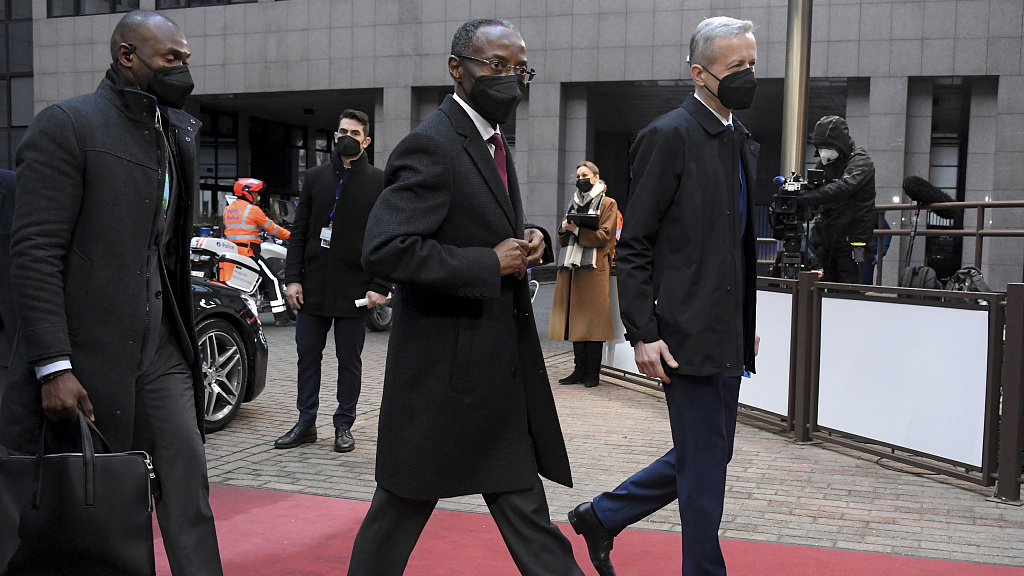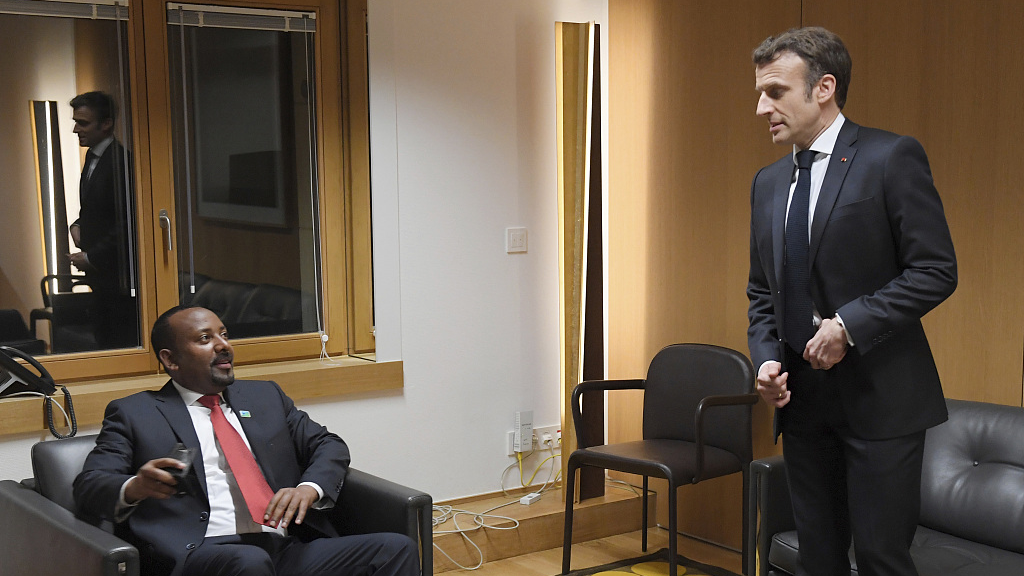
Angola's Vice-President Bornito de Sousa Baltazar Diogo arrives for an EU Africa summit in Brussels, February 18, 2022. /VCG
Angola's Vice-President Bornito de Sousa Baltazar Diogo arrives for an EU Africa summit in Brussels, February 18, 2022. /VCG
Editor's note: Stephen Ndegwa is a Nairobi-based communication expert, a lecturer-scholar at the United States International University-Africa, and an author and international affairs columnist. The article reflects the author's opinions and not necessarily the views of CGTN.
Tens of state and government leaders from Africa are trooping back to their respective countries after the two-day summit between the Africa Union (AU) and European Union (EU) that ended in Brussels, Belgium on February 18. This is the sixth AU-EU summit after the first one was held in Cairo, Egypt in 2000.
It was the first AU-EU summit in four years, delayed more by the COVID-19 pandemic. Unlike previous occasions, there was not much publicity about the 2022 summit, underscoring the fact that the event could be losing its edge, even as the EU dangled an estimated $170 billion in funding for investments in transport, economic integration, green energy, healthcare and security programs.
Observers feel that the EU failed to address the most urgent needs of its partner, particularly the social and economic recovery from COVID-19. This is a potential area of conflict as the promised funds will still end up being used to ameliorate the economies hit by the pandemic rather than start new projects on top of a weakened social and economic foundation.
After independence, African countries and their European colonizers became strange bedfellows. Even in post-independence, some African countries still feel beholden to their erstwhile colonizers, while European countries still have a sense of entitlement in what they called the "dark continent". Though latent, there are still remnants of colonial mentality in Europe's dealing with Africa, as the former has an inordinately large share of voice in the partnership.

French President Emmanuel Macron, right, meets with Ethiopia's Prime Minister Abiy Ahmed on the sidelines of an EU Africa summit in Brussels, February 17, 2022. /VCG
French President Emmanuel Macron, right, meets with Ethiopia's Prime Minister Abiy Ahmed on the sidelines of an EU Africa summit in Brussels, February 17, 2022. /VCG
However, the AU and the EU are not conjoined. Going forward, there is a growing realization in Africa that it deserves better deals in its partnerships, even though it does not have the requisite clout to stand its ground yet. Partnerships with those like the EU have become monotonous and predictable.
A perfect example of the undercurrents in Africa and Europe can be deduced from the recent announcement by French President Emmanuel Macron that he will pull out 5,000 French troops who have been domiciled in Mali and surrounding countries since 2013. Although France, the former Mali colonizer until 1960, says its aim is to protect the Mali people and its 6,000 French citizens from Islamic terrorists, Malians have increasingly resented the presence of the French forces.
In May 2020, France, through the French Council of Ministers, ratified a law that officially ended 75 years of the West Africa CFA franc. This effectively marked the end of the centralization of foreign exchange reserves of the eight West African States - Benin, Burkina Faso, Côte d'Ivoire, Guinea-Bissau, Mali, Niger, Senegal and Togo - with the French Treasury.
Experts say that in order to avoid confusion, the AU should establish structured forms of engagement with all partners. One model bandied as a platform for replication is the Forum on China–Africa Cooperation (FOCAC). Proponents of Sino-Africa partnership state the fact that it has achieved much more in a couple of decades than what Africa has gained with other major partners over a much longer period.
Africa is getting elsewhere much of what the EU offers in development assistance from countries like China and other leading economies in the East more cost effectively. Politically, the EU is hardly a role model anymore as Africa observes internal political upheavals in several European countries.
It is all getting complicated. Where does the UK, which still holds a lot of diplomatic and trade influence with Anglophone Africa, come in after Brexit? On January 20, London hosted the first ever UK-Africa Investment Summit that brought together government officials and business leaders from both sides. Africa could start having a sense of déjà vu that Europe is yet again scrambling for the continent as the latter gets pulled by individual countries to serve their interests.
Indeed, AU partners like the EU need to redefine their attitude towards Africa and drop stereotypes that have hindered some semblance of equality between the two partners, at least on the negotiating table. There is need for the EU to cede some ground in order to create a balance in the partnership by removing the notion of subservience by the weaker partner.
The EU is metamorphosing into an amorphous grouping that is forcing issues in order to remain relevant in a fast-changing world. If it loses Africa's partnership, it would have no one else to lord it over. Also, many of the European countries have since moved on after their former colonies gained independence.
Africa cannot continue acting as the EU's errand boy and geopolitical pawn. Having seen Europe's vulnerabilities exposed by COVID-19, Africa has realized it has sufficient resilience to grow without patronage but with win-win partnerships.
(If you want to contribute and have specific expertise, please contact us at opinions@cgtn.com.)

